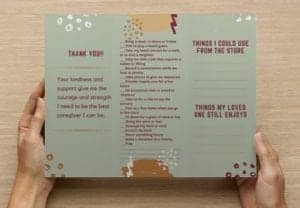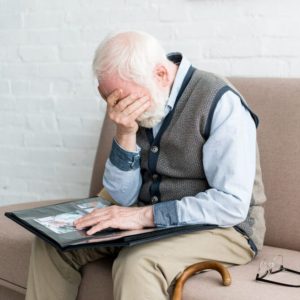ARE YOU IN DANGER OF CAREGIVER BURNOUT?
CAREGIVING IS TOUGH

Larry’s wife, Bessie, dressed in a nightgown and thin sweater, wandered away from their home on a snowy night and showed up at a house where the light was on.
The neighbor had friends over for supper, but of course she invited Bessie in and gave her a cup of tea and a cookie while phone calls were made. Eventually, Larry, accompanied by a first responder, arrived to escort Bessie home.
The episode, which must have felt like hours to Larry, lasted about 30 minutes. When the friends gathered around the table to finish their dessert, they talked about how difficult it must be for her husband.
There were no leisurely conversations for Larry, no jovial suppers with friends, no going home to normalcy.
He could not even go to the bathroom without worrying about what his wife might do next.
Sleeping with one eye open and attending to his wife’s every personal need, he had no respite in this journey of caregiving. And Larry is not the exception.
CAREGIVING IS A LONELY CALLING

In the U.S. an estimated 53 million caregivers help a spouse, parent, or child with special needs. According to the 2020 Caregiving in the U.S. report from AARP and the National Alliance for Caregiving (NAC), 61 percent of caregivers are women.
Social services help people like Larry, daycare programs help, and prayer helps, but in the end, caregiving is a lonely calling because people who staff those programs go home to their families.
Friends who occasionally stop by leave to attend their other responsibilities or perhaps go out for supper.
The caregiver has no place to go. He or she is always home, always on call, always awake. And always denying the danger of burn out.
No time for that ‘luxury.’

It may be time to
GET A FREE CHECKLIST FOR
YOURSELF OR A FRIEND
Click Here
THE PICTURE OF SELF-CARE
I am not a therapist, life coach, or doctor. It doesn’t take a professional to know that a caregiver’s attention to his or her own needs is the best prescription to avoid caregiver burnout.
So what does self-care look like?

Caring Bridge has a list of 25 ways caregivers can care for themselves.
They are beautiful suggestions. I encourage anyone who struggles with caregiving to check out this list.
But what do you do when you have no energy to do the things on the list, like pick up the phone? And ‘stretch and breathe’ is almost asking too much?
PERMISSION TO FEEL

That’s when you have permission to cry.
Tears are not a negative thing. (Don’t tell that to a New England Redneck.) Tears are a gift that brings balance to a barren soul the same way a downpour of rain will revive vegetation that has been sitting in a drought.
If the person you care for is a spouse, this may the first time you have wept without being held and comforted by your loved one. Or you may be a ‘tough guy’ (or gal) who doesn’t cry.
Yet.
That’s okay. Even if you can’t cry yet, don’t be afraid to ask for help.

GET A FREE CHECKLIST FOR
YOURSELF OR A FRIEND
Click Here
WHEN YOU FEEL LIKE CRYING…
WHAT HELPS AND WHAT DOESN’T
Acknowledge the loss.
When you’re an overwhelmed caregiver, what you may genuinely need is an acknowledgment of the weight of loss and grief. We need permission to rant. To weep. To mourn. Without judgment. Without ‘help’ to cheer you up. A caregiver on the edge of burnout doesn’t need to add ‘getting a grip’ to the list of things to do. (Read more about caregiver lamentation.)
Be gentle with yourself.
Along with acknowledging the pain of this journey, it helps to be as gentle with yourself as you would with a fragile orchid. Tend yourself lovingly, expose yourself to light and air, and treat yourself to your favorite food.
 Nourish both your body and your soul.
Nourish both your body and your soul.
There is a tendency for caregivers to take on the restrictions and participate in the passions of the one who is receiving care. You end up eating hot dogs every night because that is all she wants. Or you watch football games (which you hate) because that keeps him quiet.
 Get yourself a pair of earbuds and listen to whatever
Get yourself a pair of earbuds and listen to whatever
nourishes your soul. The individual ear ‘pods’ are the best,
because you can listen in one ear and keep the other
open for your loved one’s needs.

And it wouldn’t be me if I didn’t encourage you to write
Use a journal. – Use a notepad. – Use an iPad. –
Use your phone. -Pen letters.
But write.
Are you experiencing caregiver burnout?
Find a way to release your story. You will be glad you did.
Write and tell me about your story.
I care!
(If you don’t want your comments to be public,
sign up for my newsletter below and respond to me by email instead.)
Other articles you may enjoy.
- “What is Caregiver Guilt”,
- “A Service Dog Speaks to Caregivers”,
- “Learning to Lament, a Guide for Caregivers”.
Subscribe to a weekly newsletter of inspirational reflections, quotes and images.
When you reply to the newsletter, your email will come directly to me. I will always reply.
I look forward to hearing from you.


helen Willey
Thanksgiving way back when first here, my neighbor left her home while her house was full of family and guests. My porch light was on and door open and she came right in; dressed in bathrobe and slippers; scared the be-Jesus out of me . I knew her well. She was always smiling and husband doted, a caregiver with patients of a saint. That’s my caregiver story. Happy Thanksgiving to you . (edited for privacy)
Ardis Mayo
Yes, this is not an uncommon scenario at all. Our world is full such saints.
Susan Shofner
Both my parents have passed. I lived at home with them. Dad went first, to a nursing home until he passed in November 2008. Mom became ill and developed sepsis in January 2012. She lived until Memorial Day weekend. I was still working a full time job. They both did well, until they did not. My days off were spent doing house work & yard work, running errands, grocery shopping, helping my parents negotiate many financial matters. The two years my dad was in the nursing home, I took my mom to see him at least once every day. After my dad passed and mom became ill I would visit her in the hospital and nursing home out of town before she was finally able to be moved to a nursing home in our town. Before all of this happened I woke up early one morning, I “heard” in my mind “The Lord is my shepherd, I shall not want.” Not only did I hear this but I felt as though God had reached out and touched my heart. Those words became my daily prayer. Even when I wanted to cut and run — I stayed. Looking back now I wonder how I managed. Support from my church family and some people at work helped. But that early morning experience lingers with me to this day and gets me through what comes my way.
Ardis Mayo
Thank you for sharing your story, Susan. Early morning words of assurance are miracles that carry us through.
Pingback: